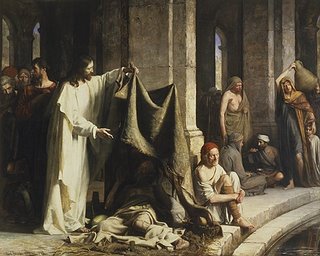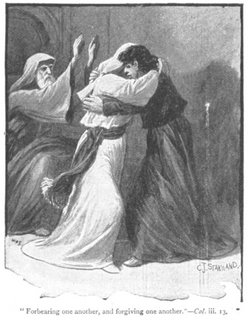
2nd Sunday of Lent
Mk 9:2-10
Today is the Second Sunday of Lent. We continue reading from the Gospel of Mark.
Last Sunday, the First Sunday of Lent, Mark told us that Jesus was driven by the Spirit into the wilderness, where He fasted and was tempted by Satan for forty days and forty nights. Mark informed us that during that 40-day retreat in the wilderness, Jesus had wild beasts and angels for a company. The Gospel last Sunday was very short. It ran for only four verses. Brevity is characteristic of the Markan Gospel.
Matthew, Luke, and Mark give us an account of the Lord’s temptation in the desert. However, while Matthew and Luke report it in a very detailed fashion, Mark seems to mention it only in passing. He does not tell us how many times Satan tempted Jesus or if Satan left Jesus alone after his antics failed on Him. Mark simply says that Jesus was tempted by Satan in the wilderness. He leaves us hanging. Or does he?
I cannot speak for Mark. But I think it is significant that Mark does not mention whether Satan left Jesus alone after tempting Him in the wilderness or not because the fact of the matter is that Satan never left Jesus alone. From the wilderness through Calvary, Satan tagged along Jesus. Satan used every opportunity and every person possible in his desperate move to tempt Jesus against doing the Father’s will according to the Father’s way. He did not want Jesus to obey the will of God. Or, given that Jesus would never be allured into disobeying God, Satan hoped he could at least make Jesus obey God’s will but not according to God’s way. This is the perennial temptation of Jesus, who is like us in all things but sin.
It is within this context that I suggest we reflect on the Gospel today. Mark is still our storyteller this Sunday. He narrates to us what we have entitled as “The Lord’s Transfiguration”. Interestingly, he recounts to us something about he was not a first-hand witness to. He himself says, only Peter, James, and John were with Jesus when He went up on a mountain and was transfigured while conversing with Moses and Elijah. Being a disciple of Peter, we can safely conclude that Mark is relating to us today a story he himself received from Peter. In a sense, Peter is our real resource speaker today.
We have already heard many homilies and read many reflections regarding the Lord’s Transfiguration. We are familiar with the usual explanation that Jesus was transfigured in the presence of Peter, James, and John in order to prepare His three closest apostles for His impending death in Jerusalem. We also already know that the appearance of Moses, Israel’s Lawgiver, and Elijah, the greatest Jewish prophet, conversing with Jesus signifies that Jesus is the fulfillment of all that is written in both the Law and the prophetic pronouncements. There is, however, a particular Markan nuancing that is worth mentioning here.
As mentioned earlier, Mark does not tell us that Satan left Jesus after failing in his attempts to make Him fall into his devilish suggestions because Satan did not really leave Jesus alone. The Lord’s temptation changed addresses every so often. This Sunday it happens very subtly on top of the mountain where He was transfigured.
“Rabbi,” Peter said, “it is good for us to be here; let us make three tents, one for you, one for Moses, and one for Elijah”. If we can converse with Peter face-to-face now, perhaps, not a few among us may say, “Yes, Peter, it is good for Jesus, your two other associates, and you to be there, but is that the best? And what can be better, Peter, than your proposed housing project: one for the Lord, one for Moses, and one for Elijah. But again, is that the best?”
I caught my self smiling when Mark seems to be saying, “Oh, well, Peter did not know what to say; they were so frightened.” Just a few verses away in the preceding chapter of Mark, Jesus rebuked Peter and called him Satan because Peter was trying to dissuade Jesus from going to Jerusalem because Jesus told them that in Jerusalem the chief priests and the elders of the people would arrest Him and crucify Him, but on the third day He would rise again (cf Mk 8:31-33). Peter seems to be Satan’s favorite. Satan would use him to tempt Jesus. It seems that the higher you up in the ladder, the more likely Satan would use you. Beware!
Peter’s proposal to Jesus was good but not the best because Jesus had to go down the mountain and enter Jerusalem where He must face His destiny. Jesus had to fulfill God’s will according to God’s terms. Yes, it is good to stay and perhaps reside on top of the mountain where Jesus was transfigured, safe from His enemies who would put Him to death, but it was not the best. If Jesus were not to go to Jerusalem and there die in the hands of His enemies, He would not also rise after three days and be able to give us the same glorious end. The best is always in doing God’s will according to God’s terms. And to pitch a tent for Jesus, which in Hebrew means “to dwell or to reside”, up on the mountain was not doing God’s will according to God’s terms. It was simply not the best.
The two readings that precede the Gospel today, each gives us an example.
In the First Reading (Gen 22:1-2.9.10-13.15-18), to keep Isaac alive was certainly good not only for Isaac himself but for his father, Abraham, as well. Who will question a father’s love for his son? But when God tested Abraham’s faith, it became best to offer Isaac as a holocaust to God. Though in the deepest pain that could strike a father dead, Abraham was obedient to God. The killing of Isaac that was not what was best; rather, it was obedience to God’s will according to God’s terms. Thus, God Himself provided a ram, in lieu of Isaac, for Abraham to sacrifice as a burnt offering.
In the Second Reading (Rom 8:31-34), we may conclude that while the slaughter of Isaac was not all right with God, the death of His Son for our sake was totally acceptable to Him. Jesus could have complained though, protesting, “But why Me? Of all men, why Me, when I am Your own Son? You did not allow Abraham to lay his hand on his son, Isaac, but why do You permit Me to die? I who am Your only Begotten?” Nonetheless, Jesus did not question His Father’s strange ways but, like “a lamb led to the slaughter and as a sheep before her shearers is silent” (Is 53:7), Jesus was “obedient unto death, even death on a cross” (Phil 2:8)!
Thus we on Easter Vigil, we sing:
““Father, how wonderful your care for us!
How boundless your merciful love!
To ransom a slave
you gave away your Son.
“O happy fault (felix culpa), O necessary sin of Adam,
which gained for us so great a Redeemer!” (Exultet, The Roman Misal).
Both the First and Second Readings teach us that whatever God’s will is and fulfilling it according to His terms was, is, and will always be the best. And the Gospel today mirrors to us our perennial temptation to allow the good to grab the place of the best.
The enemy of the best is not the worst. The enemy of the best is the good. We always have good reasons why we fail to do the best. We find good reasons why we miss Sunday Mass, why we forget our daily prayers, why we do not frequent the sacraments, why we give sparingly to the needs of the Church, why we hesitate to get involved in the plight of the poor and the oppressed, why we rather be on top of our mountains and not down them where we must live through our own Paschal Mystery each day. We have good excuses, good grounds, good basis, good justification, good explanation, and good defense. But they are not the best.
The Lenten season should move us deeply to honestly examine our selves and see if, indeed, we have allowed the good to grab the place of the best. What are our good reasons for not giving God the first, the most, and the best? May we be sincere in our examination of conscience and strong in our resolve never to settle with only the good but always with only the best for God who loves us more than we know.
The Markan Gospel is the Gospel of discipleship. It teaches us how to be a true follower of Jesus. Interestingly, if the Gospel of Mark is an apple and you want to slice it equally into two, you will have to slice it through the chapter and verses of today’s Gospel. The Lord’s Transfiguration is right at the center of the sixteen chapters of the Gospel of Mark. From chapters one through eight, Jesus travels around until He reaches the peak of the mountain where we find Him today. From the ninth chapter onwards, His journey takes a very clear and definite direction: Jerusalem. After the transfiguration account, Jesus goes down from the mountain with His three disciples and turns toward Jerusalem, the place of His death and resurrection. If we are truly His disciples, we will never dare stay behind on top of the mountain but will faithfully follow Him all the way by choosing always the best over the good. Lent should not bring out the good in us, but the best. Let us not settle for anything less.
































